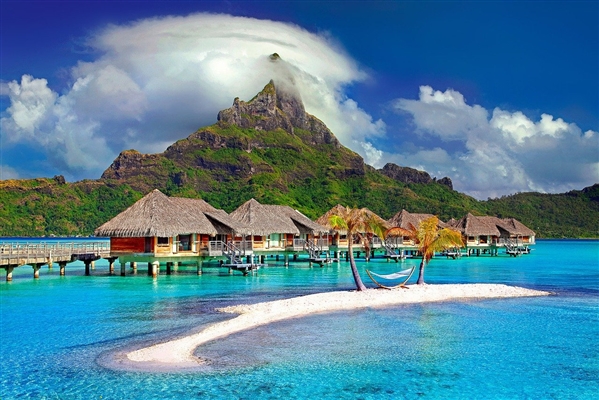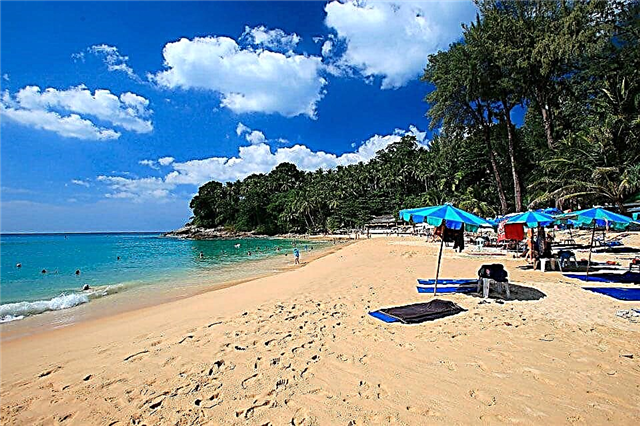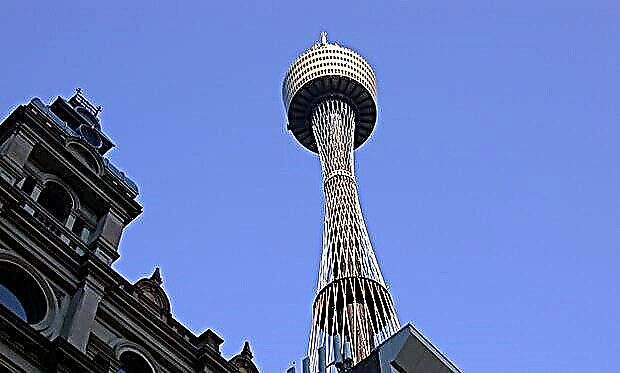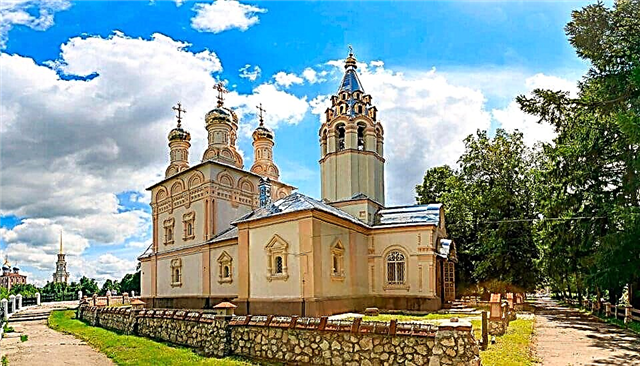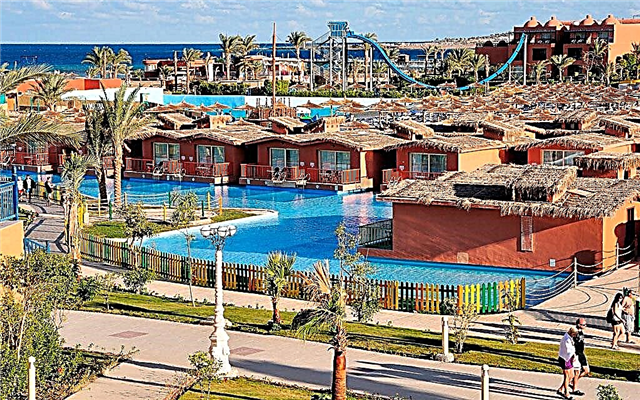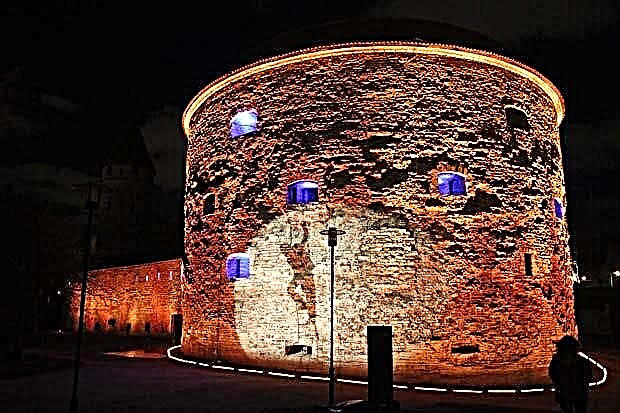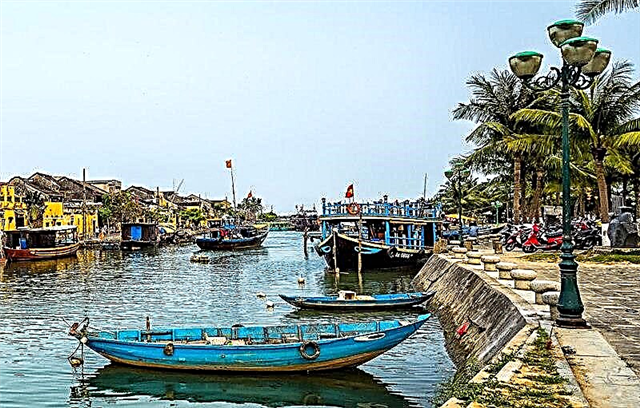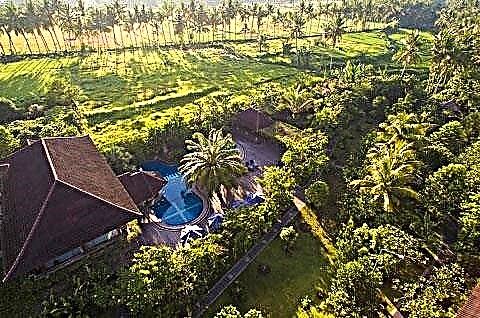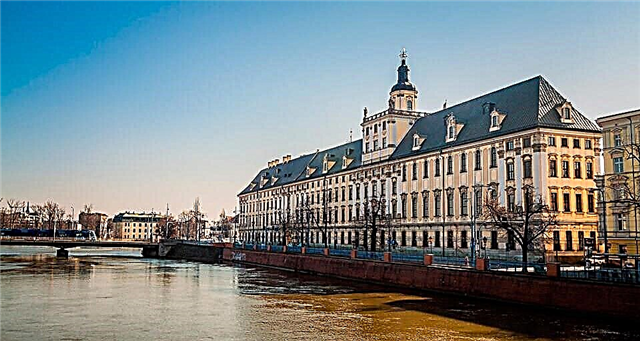Wroclaw, the capital of Silesia and the fourth most populous city in Poland, used to have the Russian name Breslau, which sounds like Breslau in German. The city is famous for a large number of bridges (the Odra and its 4 tributaries flow through it) and numerous places associated with its historical, cultural and religious past. Let's talk about the most interesting sights of Wroclaw.
City hall

One of the most striking sights is located on the main square of Wroclaw - the Town Hall, built in the early Gothic style in the 13th century. The architecture of the town hall of extraordinary beauty attracts crowds of tourists admiring the pointed domes, towers and openwork metal decorations on the central facade. In 1945, the town hall was almost completely destroyed, but the Poles restored their original appearance, preserving a wonderful monument of majestic antiquity.
An astronomical clock is installed on the south side of the facade under the triangle of the pediment, which is also the subject of attention of visitors. On the eastern wall, on a high domed tower, there is another mechanical chiming clock. Everyone who comes to Wroclaw comes to the Town Hall.
Royal Palace

Despite the relatively young age of the palace (built in 1717), the building has undergone many reconstructions in its history, reflecting the ambitions and requests of several owners of the palace. The Prussian king, who initially had the idea of building, ordered a palace in the Venetian style, very fashionable in the 18th century. The new owner - the Prussian king Frederick, having bought it out, commissioned the chief court architect Boumann to improve the building, expanding it and adding elements of the baroque style on the outside - and elements of the rococo inside.
As a result, the Royal reception rooms and the private chambers of the royal majesty were decorated with magnificent splendor. The palace began to look more majestic in appearance. But the descendant of Frederick the Great wanted to give the palace the features of classicism, which was entrusted to the architect Langhans, who in 1795 added a new staircase, several outbuildings and utility rooms.

However, in 1846, transformations were still made in the spirit of the fashion trends of the Florentine Renaissance: a building was added on the south side, the wings inside the courtyard were expanded.
In 1926, when the palace became the property of the city, the Palace Museum was opened in it, with an exhibition dedicated to Frederick the Great. The royal splendor of the interiors was removed, and the main exhibits of the museum were objects of art and applied art of Silesia.

After severe destruction in 1945, the palace was partially dismantled, and the remaining premises were housed in the Archaeological and Ethnographic Museums. To pay tribute to the memory of the historical past, a major reconstruction of the palace began in 2004, which lasted 4 years, and in 2008 the Royal Palace was opened in it, which became a museum of the entire history of Wroclaw.
The majestic buildings of the palace symbolize the power and inviolability of the power of the Polish kings, the solid foundations of modern Wroclaw.
Its architecture has embodied the majestic severity of classicism, the splendor of the Baroque and Rococo, the grace and irresistible beauty of modernity. The courtyard of the palace is a true masterpiece of street design: curly green lawns surround a fountain surrounded by statues depicting representatives of the royal dynasties of Poland.
Thousands of tourists strive to get here, on one of the most interesting excursions in Wroclaw.
Wroclaw cathedral

The two high 98-meter Gothic spiers of the unique cathedral are visible from afar, representing examples of Gothic architecture from the 13th century. The cathedral is unique in its age: it is considered the very first Gothic cathedral in Poland, built in 1272. Otherwise, it is called the Cathedral of the patron saint and protector of Wroclaw - St. John the Baptist, which deservedly has the status of the most important church not only in the city, but in the whole of Lower Silesia.
Like many other historical sites, the cathedral was badly damaged during the Second World War, but it was carefully restored: the best restorers painstakingly recreated the interiors in the Baroque style, made beautiful stained glass windows, which are truly artistic masterpieces.

Inside the church there are chapels built in the 14-16th centuries, the wall panels and decorations of which represent centuries-old spiritual art. The central hall is extraordinarily beautiful with an altar made of white marble, with magnificent statues of saints, with graceful gilding of details.
The organ, installed in 1913, was for several years the largest church organ in Poland and the whole world. The reverent respect for the instrument allows it to sound powerful during ceremonies and various events. People come here, on Cathedral Street, to listen to spiritually uplifting music, climb the cathedral towers and see below the amazingly beautiful perspective of the ancient Polish city-monument.
Zoo

One of the oldest zoos in Poland was opened when the city was called Breslau and belonged to Prussia (1865). Then it had the status of a zoological garden, because its entire territory was literally buried in the greenery of trees and shrubs. Aviaries with animals and birds have been placed against the backdrop of charming natural landscapes. During its long "life" the zoo has undergone many reconstructions and improvements and is now the most beautiful and favorite place for visitors to entertain and observe the "smaller brothers".

More than 7000 representatives of tetrapods, birds, amphibians, sea creatures and other individuals (850 species) live on an area of 33 hectares. Sharks, rays, whales live in a huge oceanarium. Rare specimens of animals and birds live in different types of ecosystems, which not everyone can see in their natural environment. A visit to the Wroclaw Zoo is an unforgettable journey into the richest world of fauna on our planet.

Address: st. Wrobiewskieqo, 1-5.
Open: every day, 09.00-16.00; Afrikarium: Mon. - 10.30-18.00, closed and Holidays. - 09.00-19.00.
Entrance fee (in PLN): adult. - thirty; stud. up to 26 liters. - 25 (on Wednesdays - 10); Sem (2 adults and 3 children) - 50; pen., inv. - 10 (Thursday).
Hall of the Centenary

This grandiose architectural monument commemorates the centenary of the liberation battle of the Poles against the Germans near Leipzig in 1813. In honor of this significant event, in 1907, the authorities organized an exhibition with projects of architectural masterpieces presented at it, designed to capture the 100th anniversary of the liberation of the city from Prussia in a monumental structure. A large-scale expensive project by the Wrocław architect Max Berg was chosen.

The result was a real architectural colossus made of reinforced concrete and glass of the original round shape, height. 42 m., With the upper dome - the national pride of Poland. The floors are built in the form of a spiral tapering upward. The huge ceremonial hall can accommodate 6,000 people, it is surrounded by spacious corridors, 56 rooms for exhibitions. For the grand opening of the Hall, the world's largest, majestic organ was installed in it, which served until 1946.

Address: Szczytnica Park, Wroclaw, Wystawowa, 1.
Working hours:
- Apr-Oct: Mon-Thu, 09.00-18.00; fri-sat, 09.00-19.00; Sun - 09.00-18.00
- November-March: every day, 09.00-17.00
- Entrance (in PLN): adult. - 12, concessional - nine
- Group of 10 people from each - 8 zlotys.
- Family (2 adults + 2 children up to 16 years old - 30 zlotys.
Racławice panorama

In fact, this monumental art canvas is unique not only for its impressive dimensions (114 mx 15 m), high visual qualities, but also for its historical significance. The Racławice Panorama is an artistic history of an episode of the Polish liberation movement led by T. Kosciuszko - the Battle of Racławice against the Russians on 04.04.1794. The majestic panorama was created in honor of the 100th anniversary of this victorious battle: the talented artists Styk and Kossak worked on it for almost a year. They painted on a special canvas ordered from Belgium using 750 kg of paints.

The finished work was placed in the rotunda of the Austrian design in Lviv in 1894, for the opening of the General Exhibition. The panoramic canvas was damaged by bombing in 1944, and in 1946 it was transferred to Wroclaw, where it was kept rolled up for a long time. In 1985, after careful restoration, the panorama was put on display in a specially erected round building, which became a place of pilgrimage for tourists and local residents.
Address: st. Jana Purkinogo 11, entrance ticket - PLN 25, it includes a visit to the National and Ethnographic Museum.
Synagogue "Under the White Stork"

Just as the name of a religious institution is unusual, so is its history. Built in the 19th century, it managed to withstand the cruel times of the Holocaust, like the mythical Phoenix bird, as a symbol of the victory of good over evil. The synagogue received an unusual name for its status from a tavern of the same name, which once stood here.
In Poland, occupied by the Nazis, it was cynically used by the Nazis as a storage warehouse for plundered property, and its yard served as a starting point for Jews in concentration camps and crematoria. After the end of the war, the Jewish Church became the center of a new Jewish community, where people came to pray and communicate. But in Soviet Wroclaw, the synagogue was subjected to repeated cases of vandalism, and during the anti-Semitic campaign, it lost its status as a church altogether.

For 20 years, there was a library and a music academy within its walls, only in 1995 a private company bought the building from the municipality and returned it to the Jewish community. From the former luxurious decoration, only skillful wooden carvings on the arches remained in it. The restoration work was completed in 2010. Now the synagogue hosts prayers, music concerts, lectures, exhibitions, theatrical performances.
Address: st. Vlodkovitsa, 7, near the Krupnitsky bridge.
The entrance is free.
Cathedral of St. Mary Magdalene

The church, built in the strict Gothic style in the 14th century, is not the first Catholic church on this site. Before that, two cathedrals managed to stand here, one of which was built in the 11th century, and the second - in the 13th. The first was barbarously destroyed by the Mongols, the second was burned down in 1342. The current church of St. Mary Magdalene has been pleasing parishioners for the 7th century, although during this time it was also affected by destruction.
Painstaking restoration work in the 20th century not only returned the shrine to its former appearance, but added new elements. The 12th century Romanesque portal of the Church of St. Mary and Vincent was brought from the Albino Benedictine monastery. The holy entrance has become a real gem of the cathedral: relief images of griffins, roses, scenes from the childhood life of Christ are a priceless relic.

The interior interiors of the central hall of the cathedral are majestically solemn, devoid of lush pretentiousness, but full of light tranquility. It is precisely this setting that corresponds to the modest appearance of St. Mary.
Address: st. Olovsk, 19.
Admission is free, the cost of climbing the cathedral towers is 5 zlotys.
Old city prison

It is easy to imagine the amazement of an uninitiated visitor to a basement beer room located in a corner building at the intersection of Prison and Nozhovnichya streets when he finds out that he is drinking beer in the former torture room. This is absolutely true, because the building with the pub is a former old prison, built in the 14th century. At first, a relatively small square building by the 17th century became rectangular due to extensions, which arose the need.
The prison housed 100 prisoners, lower-class prisoners, the most dangerous criminals sentenced to death, were held in underground rooms. The high-ranking, noble inhabitants of this gloomy establishment were located on the first floor. In the 20th century, the building was restored 2 times, and after the war of 41-45. it lost its status as a prison: the Institute of Archeology and Ethnology was opened there. The old name was assigned to a summer cafe, opened in a former prison yard. Only the inscriptions of former prisoners carved on the walls remind of the prison. Traditional Wroclaw sights - funny gnomes - look cute and harmless against their background.
Address: st. Prison, 9, next to the Market Square.
Sculptural group "Transition 1977-2005"

Initially, until 1981, this composition was located in the center of Warsaw, but then it was dismantled, and it was restored only 24 years later, but not in the capital of Poland, but in Wroclaw. This is a memorial to the victims of martial law. The sculptural composition consists of two elements, each of which includes 7 figures of people, some of which go underground, and the other part, on the contrary, emerges from the ground. The first part symbolizes citizens who went missing during martial law, the second - people who decided to fight and eventually defeated the military regime in the country. The composition was installed in a place where during the difficult political situation in the country the most active demonstrations and rallies took place.
Church of St. Elisabeth

The Church of St. Elжbiet, located on the market square, was built in the 14th century. During its centuries-old history, the building suffered several fires, due to which the tower and the spire suffered the most, by the way, they have not been restored now and stand out from the general appearance of the church. In addition to the fires, the Church of St. Elжbiet was destroyed by a powerful hurricane in the first half of the 16th century, which destroyed its tower.
The church is made in the Gothic style and is considered one of its best representatives in Europe. On the bell tower of the church, which is 90 meters high, there is a small observation deck, which offers a magnificent view of the city, and in good, clear weather, you can see mountains on the horizon. A narrow spiral staircase inside the tower leads to the observation deck. The interiors of the Church of St. Elжbiet are decorated with beautiful elegant stained glass windows.
Houses of Yas and Malgos

Not far from the Church of St. Elzhbeta there are 2 houses named after the heroes of the folk tale, the more famous analogue of which is the German fairy tale by the brothers Grimm about Hansel and Grettel. The houses of Yas and Malgos are all that remains of the medieval quarter, where artisans, bell ringers and merchants lived. The two houses, standing at an angle to each other, are made in similar restrained colors: one painted in creamy white, the other in pink and white. The buildings are interconnected by an arch that forms a passage to the Church of St. El Эльbiet. Today, the houses of Yas and Malgos are one of the most popular tourist destinations in Wroclaw, which can be found in all guidebooks.
Wroclaw Opera

The Wroclaw Opera was built in the 19th century by Karl Ferdinand Langgans. The building, made in classical style, is recognized as a historical architectural monument. The opera was damaged by floods at the end of the 20th century, but was soon completely renovated. Her repertoire is very wide and offers the viewer works of opera and ballet of different styles and eras, including works by Mozart and Prokofiev. Sometimes the Wrocław Opera gives its performances not in the theater building, but on city venues: in parks, in squares, in the National Museum. Opera tickets cost between 20 and 300 PLN.
National Music Forum

The National Music Forum is a modern cultural institution, built several years ago, which is one of the largest European music centers. The building of the NFM houses a recording studio, conference rooms, a library, offices, rehearsal rooms, as well as 4 concert halls with a total capacity of more than 2500 people. The NFM organizes the activities of 11 musical groups of the city. The building of the National Music Forum hosts major international festivals, tickets for which, as well as for regular concerts, can be bought at the box office or on the official website, where you can also familiarize yourself with the full repertoire of the NFM.
National Museum

The National Museum is one of the most famous and popular museums in the city. It was built in the 19th century and is similar to traditional German art museums. The exposition of the national museum mainly consists of paintings and sculptures, mostly from the creations of local masters. The first floor is devoted to religious themes, the second and third floors contain statues, paintings, some of which date from the 13th and 17th centuries, ornaments, sarcophagi and furniture decorated with handmade cuttings. The building of the museum itself looks very unusual: it is almost completely covered with climbing plants, and it seems that it has been abandoned for many centuries.
Koleikovo

The Kolejkovo Museum, located in the building of the old railway station near the market square, is the largest urban railway model in Poland, the total length of the railways of which is 430 meters. The layout shows 15 trains running on its territory, the total number of cars of which is 60, as well as more than 1000 figurines of people that are not just randomly arranged, but form certain scenes from life: a wedding, a performance by a local musical group, workers resting after a difficult working day at a local bar.
And all this is so worked out and detailed that you can see what kind of food lies with the wedding guests or the prices for vegetables in the local market. Koleikovo is a great place that will be interesting not only for children, but also for adults, because it literally brings you back to childhood.
Hydropolis

Hydropolis is a modern interactive museum housed in a former drinking water tank. This place will allow you to learn almost everything about water. There are lecture halls with projectors, multimedia laboratories where master classes and experiments with water are held. Visitors can see an exact copy of the Trieste bathyscaphe, which made a record dive into the Mariana Trench in 1960, models of unusual ocean inhabitants, as well as a model of an example of ancient marine engineering - the ancient Greek ship "Syracuseanca".
It works daily, on weekdays from 9:00 to 18:00, on weekends from 10:00 to 20:00. The entrance ticket costs 27 PLN, a discount ticket for children under 18 and pensioners costs 18 PLN, a family ticket allowing two adults and two children to visit the attraction costs 72 PLN.
Wroclaw University

The university was opened in 1702, and in 1945-1946, after the end of the Second World War, it was reorganized and received the status of a state one. However, the first attempts to create a university in Wroclaw date back to the beginning of the 16th century, when King Vladislav II Jagiellon signed a decree on the creation of a higher educational institution, but that period was accompanied by constant wars and armed conflicts, so the idea of establishing a university had to be abandoned.
In 1638, a school was opened in Wroclaw, on the basis of which, 65 years later, the Leopoldin University was created, named after the Holy Roman Emperor Leopold I, who signed the decree on its creation. Today, more than 31 thousand students study at the university, and among its graduates there are such outstanding personalities as the world famous singer Anna German and director, one of the founders of the Polish film school, Stanislav Lenartovich.
Train Station

The railway station was built in 1857 in the not yet developed area of Wroclaw, then part of Prussia. The first work on the expansion of the station was carried out at the turn of the 19th and 20th centuries. and were completed in 1904. During the Second World War, the railway station building was seriously damaged, and warehouses and shelters were built under the station square. After the end of the Second World War, the station was renovated, building in parallel with this premises for a small cinema. Several years ago, the railway station was overhauled, the number of platforms was increased, and the shelters from the Second World War were converted into a parking lot.
Sky tower

Sky Tower (Sky Tower) - a skyscraper, which is the tallest building in the city, the third tallest building in the country, was built in 2012. Sky Tower is a complex of three buildings, the first of which is dedicated to galleries and an entertainment center, the second houses residential apartments and offices, the third building is also occupied by apartments and offices, and also has the highest observation deck in Poland, from which panoramic view of the city. The entrance ticket costs 10 PLN.
Grunwald Bridge

Grunwald Bridge is one of the longest bridges in Poland (112 meters), built over 100 years ago, in 1910. The grand opening was personally attended by Emperor Wilhelm II. In different years it had the names of the Imperial Bridge and the Freedom Bridge. The Grunwald Bridge connects the old part of Wroclaw with Tumski Ostrov, separated from each other by the Oder River.
Tumskiy bridge

The Tumskiy Bridge leads from the old town to Tumskiy Ostrov, where the Catholic Church, the University Library and the Elena Chodkovski School of Management and Law are located. This pedestrian steel bridge was built in 1889 on the site of an old wooden bridge. In front of the entrance to the bridge from the side of the old city, there are statues of Saints Jadwiga and John the Baptist. Tourists know the bridge from the footage from the film "To Kill the Dragon" directed by Mark Zakharov.
Shchitnitsky park

Szczytnica Park is one of the largest parks in Wroclaw, with an area of about 100 hectares. The park originated in the 18th century, when local residents took a fancy to the forest park area near the village of Shchitniki and began to regularly get out here on weekends. At the end of the 18th century. the commander of the garrison of Breslau F.L. Hohenlohe acquired a part of the forest park, where he created an English-style park. In the 19th century. For over 70 years, horse races have been held here. On the territory of the park there is a wooden church of St. John of Nepomuk, built in the late 16th - early 17th century. Interestingly, the church was originally located in a different place and was moved to the Shchytnitsky Park only in 1913.
Japanese garden

The Japanese Garden is a garden and park complex that is part of the Schitnitsky Park, created at the beginning of the 20th century by Count Fritz von Hochberg. The famous Japanese gardener Mankishiyo Arai took part in the creation of the park, whose work and stone fragments brought from Japan predetermined the unique style of the garden.
The Japanese garden was abandoned during the First World War and was restored only in 1997, but after 2 months it was seriously damaged due to severe flooding. It took 2 years to rebuild the garden. The Japanese Garden of Wroclaw is a real oasis of Japan in the center of Europe, on its territory there are several ponds with fish, artificial waterfalls and gazebos made in the Japanese style. Today, the Japanese Garden is one of the city's main recreation areas for locals and tourists.
Light and music fountain

The Musical Fountain, opened in 2009, is located not far from the Century Hall in the Shchytnitsky Park. The area of the fountain basin, which has 300 taps for water supply, is about 1 hectare.In addition to water taps, the fountain is equipped with fire nozzles and many points of light supply, as well as a projector and a laser installation, thanks to which locals and guests of the city can watch a magnificent light and music performance in the evening. The fountain operates from late April to late December and is used as an outdoor ice rink in winter.

